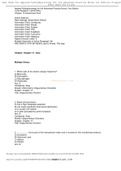Exam (elaborations)
Applied Pathophysiology for the Advanced Practice Nurse, First Edition Lucie Dlugasch, Lachel Story Chapter 13 Assessment Quiz
- Course
- NURS 502
- Institution
- St. Thomas University ( )
1. Which cells of the dermis release histamine? A) Mast cells B) Eosinophils C) Macrophages D) Histiocytes Ans: A Complexity: Easy Ahead: Inflammatory Integumentary Disorders Subject: Chapter 13 Title: Integumentary Function 2. Basal cell carcinoma: A) has a high metastasis potential. B...
[Show more]



